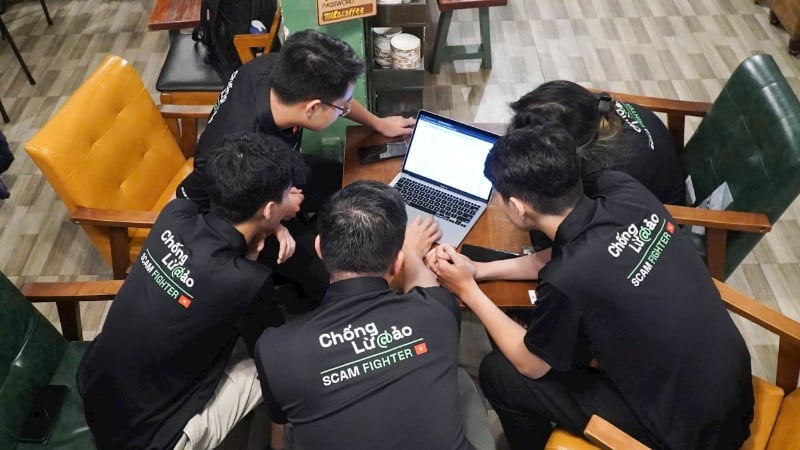
Therefore, equipping each individual with technological knowledge, skills to identify and prevent fraud is a prerequisite for people to live safely in the digital environment.
Using technology to set traps
Over the past time, the authorities have continuously warned, but the situation of fraud in cyberspace is still complicated and has serious consequences. Cybercriminals have taken advantage of technology to create convincing fraud scenarios that can make even alert and vigilant people become victims.
Whenever people have a need such as updating identification information, booking a hotel room, buying tickets to a concert, looking for investment opportunities, criminals almost immediately appear and try to set traps.
Cybersecurity expert Ngo Minh Hieu (Hieu PC), Director of “chongluadao.vn” said: “Deepfake and AI voice cloning tools can fake voices, faces, and even video calls, making it difficult for users to distinguish between real and fake. Many victims are highly vigilant and understand scams, but just a video of a “child crying for his parents” sent to them is enough to overwhelm their emotions and make them fall into the trap. By using voice over IP (VoIP) technology and faking the number displayed on the phone screen, the subjects can also make people believe that they are receiving calls from authorities, thereby enticing them to transfer money or declare personal information. Not only stopping at impersonation, some current biometric authentication systems have also been bypassed. Subjects can use deepfake photos, videos , or 3D printed models to fool facial and fingerprint scanning systems, especially with sketchy security platforms”.
After the State Bank applied biometric authentication to personal accounts, scammers changed their tactics, set up "ghost" businesses, opened accounts under the names of legal entities to lure people to transfer money into business accounts.
More worryingly, taking advantage of AI algorithms that suggest content (recommendation) on YouTube, Facebook, TikTok, criminals can bring the content they want to users. People who have been scammed may be recommended to watch new scam content such as "how to get back lost money", "recover account",... This is a vicious cycle: being scammed, losing money, panicking, trying to recover and continuing to be scammed a second time, a third time...
According to the Ministry of Public Security, from mid-February to the end of May 2025, hundreds of cyber fraud cases were recorded, causing losses of more than VND 1,000 billion. In addition to criminals taking full advantage of digital technology, important causes come from psychological vulnerabilities, limited digital skills and unsafe online usage habits of users.
Another reality is that businesses still do not strictly comply with regulations in protecting customers' personal data, and have allowed major personal data leaks to occur.
According to the Ministry of Public Security, from mid-February to the end of May 2025, hundreds of cyber fraud cases were recorded, causing losses of more than VND 1,000 billion. In addition to criminals taking full advantage of digital technology, important causes come from psychological vulnerabilities, limited digital skills and unsafe online usage habits of users.
Equip knowledge, build self-protection skills
Master of Psychology Vu Thu Ha, Vietnam Institute for Psychological Training and Intervention Research, shared: “People often receive messages and warnings from authorities and the media about online fraud cases and phenomena. However, many people do not fully understand the specific forms and tricks, so when they are scammed, they still fall into a passive state.”
To improve the effectiveness of preventing online fraud, providing detailed, vivid, easy-to-understand information about fraud methods, clearly analyzing the techniques used by cybercriminals, and simulating real-life situations needs to be further promoted.
After the State Bank applied biometric authentication to personal accounts, scammers changed their tactics, set up "ghost" businesses, opened accounts under the names of legal entities to lure people to transfer money into business accounts.
In particular, for specific target groups such as the elderly, people in remote areas, people with limited access to mainstream media, etc., appropriate forms of propaganda are needed. According to Senior Lieutenant Phan Van Phong, Nghia Do Ward Police, Hanoi City, in order to effectively protect people in cyberspace, the drastic participation of the grassroots political system is essential. Training sessions, seminars, neighborhood meetings; establishing information sharing groups are important channels for propaganda, guiding people to identify and avoid scams. At the same time, it is necessary to always be aware of going to every alley, sharing with every house about essential content whenever possible. "The grassroots cadres also set out principles for people such as only contacting through an official phone number, only meeting directly at a specific location, always verifying information through reliable sources before transferring money or declaring personal information", Senior Lieutenant Phan Van Phong shared.
Cybersecurity expert Ngo Minh Hieu pointed out that many people still lack easily accessible defense tools in the digital environment. Many people do not know how to look up a suspicious link, do not know how to check if a call is real or fake, and do not know where to report fraud quickly and correctly.
Currently, some units and organizations have built quite good platforms to support people in verifying information, warning about fake websites and new forms of fraud. These include tinnhiemmang.vn, ntrust.vn, dauhieuluadao.com, chongluadao.vn... However, according to users' feedback, the friendliness and convenience of these tools still need to be improved. Widespread communication about support platforms also needs to be further promoted, especially integrated into digital skills education programs, with simple and intuitive instructions for people of all ages.
Local officials also set out principles for people such as only contacting via an official phone number, only meeting in person at a specific location, and always verifying information through reliable sources before transferring money or declaring personal information.
Lieutenant Phan Van Phong,
Nghia Do Ward Police, Hanoi City
Set up effective "shields" with comprehensive identification
Despite many efforts, state management in the fields of banking, telecommunications, internet, etc. still has many loopholes and shortcomings, leading to the situation of buying and selling personal information, using bank accounts without the owner's name, "junk" SIM cards, etc. on cyberspace, allowing criminals to take advantage of and commit online fraud. The National Assembly recently passed the Law on Personal Data Protection, clearly defining the responsibilities of data controllers, processors and third parties. The law will take effect from January 1, 2026, and is expected to be a fundamental solution, creating a legal corridor to resolve the above situation.
Lieutenant Colonel Vu Trong Nghia, Deputy Head of Division 5, Department of Cyber Security and High-Tech Crime Prevention (A05) said: “It can be seen that most criminals use the services of cross-border businesses to commit fraud. Department A05 has worked with these businesses to request and propose coordination in the prevention of online fraud and property appropriation. In the coming time, the unit will continue to coordinate to improve propaganda and detection solutions to proactively prevent online fraud activities early.
Research on the approach to identifying the entire internet access system has also been mentioned. According to Mr. Phan Phu Thuan, Cyber Security Expert, FPT Smart Cloud, FPT Corporation: “If this approach is implemented, it will maximize the ability to authenticate user identities in internet access activities. The system will prioritize identification at the highest possible level for public activities, financial transactions and online services, creating a traceable “digital fingerprint” for each user (account name, IP address, access time, access device, etc.). This method allows maintaining a balance between protecting personal privacy and the need to trace the origin of fraudulent activities, eliminate fake accounts in high-risk areas and increase the legal responsibility of internet users at an appropriate level”. This will be an effective “shield” to prevent cybercrime while still ensuring flexibility in internet access.
While waiting for fundamental solutions to be realized so that criminals "cannot, dare not and do not want to" commit fraud in cyberspace, the first and most practical line of defense is still for each citizen to equip themselves with knowledge and skills to prevent it.
People should regularly monitor official information sources to proactively update their technological knowledge and new forms of fraud, always be vigilant and remember by heart some principles when operating in cyberspace such as carefully verifying information sources, not providing personal information to unverified sources, and not curiously clicking on strange links.
And most importantly, never think “I will never be fooled”. It is overconfidence that makes you the next victim.
Source: https://nhandan.vn/thiet-lap-ky-nang-phong-ve-ca-nhan-trong-ky-nguyen-so-post896283.html


































































































Comment (0)